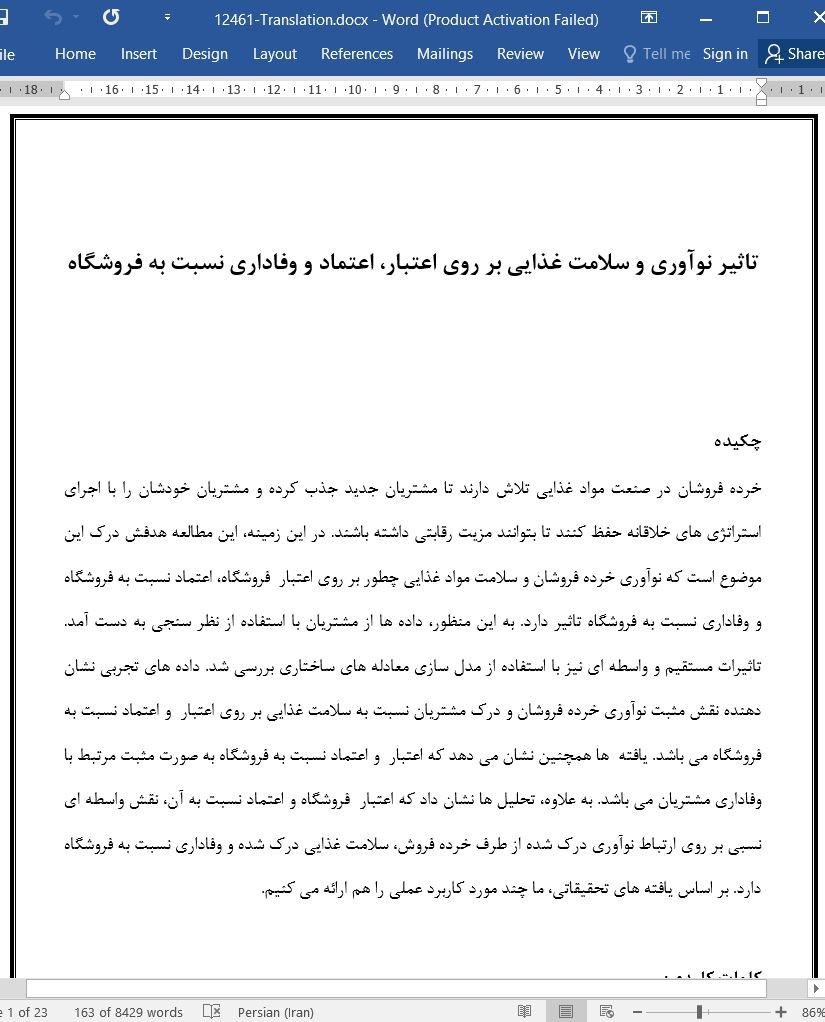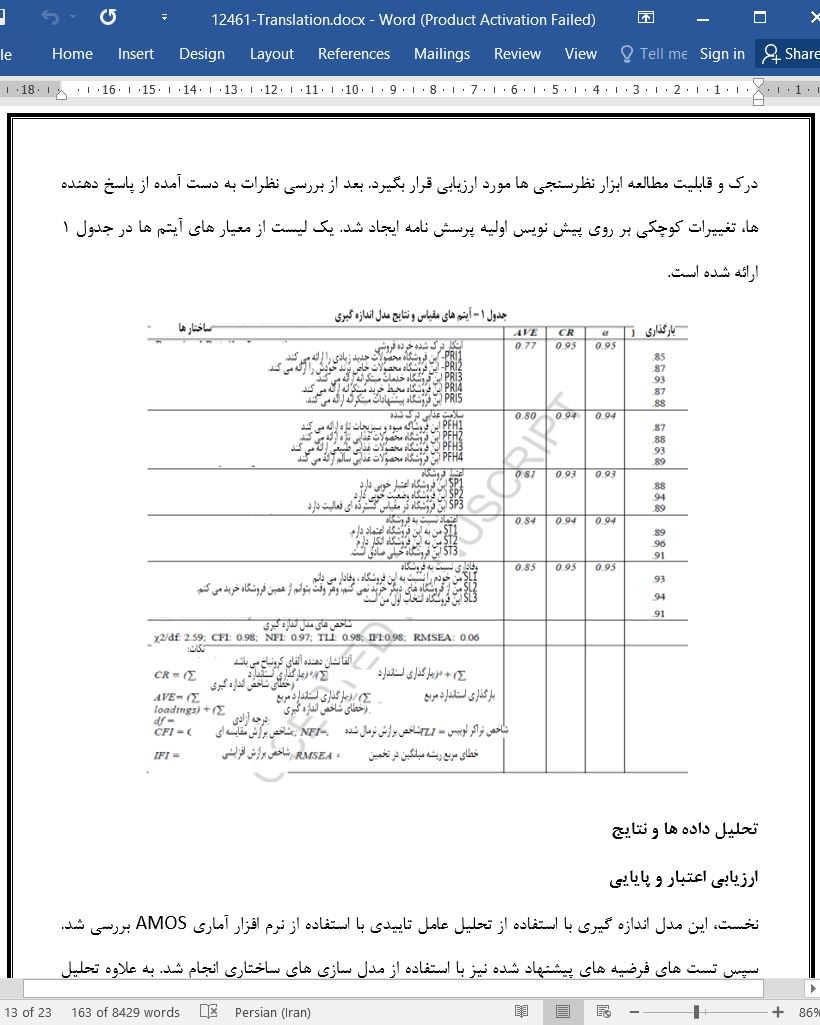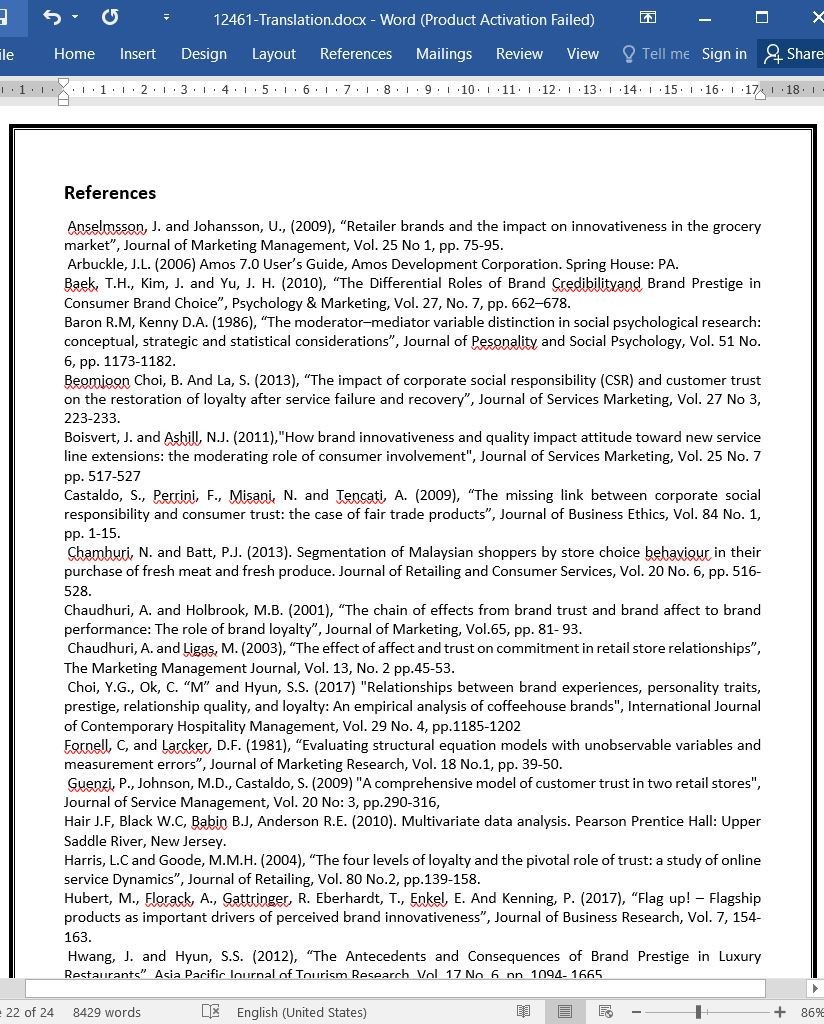
دانلود مقاله تاثیر نوآوری و سلامت غذایی بر روی اعتبار، اعتماد و وفاداری نسبت به فروشگاه
چکیده
خرده فروشان در صنعت مواد غذایی تلاش دارند تا مشتریان جدید جذب کرده و مشتریان خودشان را با اجرای استراتژی های خلاقانه حفظ کنند تا بتوانند مزیت رقابتی داشته باشند. در این زمینه، این مطالعه هدفش درک این موضوع است که نوآوری خرده فروشان و سلامت مواد غذایی چطور بر روی اعتبار فروشگاه، اعتماد نسبت به فروشگاه و وفاداری نسبت به فروشگاه تاثیر دارد. به این منظور، داده ها از مشتریان با استفاده از نظر سنجی به دست آمد. تاثیرات مستقیم و واسطه ای نیز با استفاده از مدل سازی معادله های ساختاری بررسی شد. داده های تجربی نشان دهنده نقش مثبت نوآوری خرده فروشان و درک مشتریان نسبت به سلامت غذایی بر روی اعتبار و اعتماد نسبت به فروشگاه می باشد. یافته ها همچنین نشان می دهد که اعتبار و اعتماد نسبت به فروشگاه به صورت مثبت مرتبط با وفاداری مشتریان می باشد. به علاوه، تحلیل ها نشان داد که اعتبار فروشگاه و اعتماد نسبت به آن، نقش واسطه ای نسبی بر روی ارتباط نوآوری درک شده از طرف خرده فروش، سلامت غذایی درک شده و وفاداری نسبت به فروشگاه دارد. بر اساس یافته های تحقیقاتی، ما چند مورد کاربرد عملی را هم ارائه می کنیم.
مقدمه
برای بیشتر شرکت ها، نوآوری برای حفظ مشتریان فعلی، جذب مشتریان جدید و حفظ آن ها ضروری می باشد (Kunz et al., 2011, p. 816). خرده فروشان مواد غذایی نیز رقابت بسیار زیادی را پیش روی خودشان می بینند و افراد جدیدی با سبک کار متفاوت همواره در حال ورود به این بازار هستند. در این محیط رقابتی، خرده فروشان در کاربرد های مبتکرانه مانند سیستم های پرداخت خودکار، برنامه های جدید برای وفاداری مشتریان، طراحی های مبتکرانه برای فروشگاه ها، و ارائه کردن محصولات و سرویس های مختلف تلاش دارند تا بتوانند خودشان را نسبت به رقبا متمایز کرده و در این زمینه سرمایه گذاری های خوبی انجام میدهند. این کاربرد های مبتکرانه می تواند باعث شوند که فروشگاه های سنتی، جذابیت بیشتری داشته باشند تا بتوانند باعث تحریک خرید در مشتری ها شوند (Lin et al., 2015, p. 33).
استفاده گسترده از مواد افزودنی و مواد نگهدارنده در صنایع غذایی، باعث افزایش آگاهی مشتریان نسبت به امنیت غذایی شده است. به دلیل افزایش گسترده مشتریانی که نسبت به سلامتی خودشان اهمیت میدهند، خرده فروشان مواد غذایی نیز به صورت پیوسته توجه بیشتری به موضوعات سلامتی دارند. در این زمینه، خرده فروشان مواد غذایی فضای بیشتری را در قفسه های خودشان به محصولات غذایی سالم اختصاص داده اند. به علاوه، بعضی زا خرده فروشان نیز برچسب های اختصاصی ارگانیک را بر روی مواد غذایی خودشان قرار میدهند تا مشتریانی که نسبت به سلامت خودشان حساس هستند را با قیمت های مناسب، جذب کنند. به دلیل اهمیت سلامت در مصرف غذا، تازگی و سالم بودن محصولات غذایی فروخته شده در فروشگاه ها، این موضوعات بر روی انتخاب خرده فروشان مختلف توسط مشتریان، اهمیت بسیار زیادی دارد (Kim et al., 2013; Chamhuri and Batt, 2013).
محدودیت ها و تحقیقات آتی
با وجود پیامدهای نظری و مدیریتی این تحقیق حاضر ، محدودیت هایی نیز وجود دارد. داده های به دست آمده از مصرف كنندگان در يك شهر با روش نمونه گيري ساده حاصل شد كه تعميم پذيري نتايج را محدود مي كند. برای به دست آوردن نتایج جامع تر باید تحقیقات آینده در شهرها و کشورها مختلف انجام شود.
مطالعه حاضر روی خرده فروشان مواد غذایی متمرکز شده است که پیامدها را نیز محدود می کند. علاوه بر این ، این مطالعه حاضر با استفاده از فروشگاه های خرده فروشی مواد غذایی فیزیکی برای درک نقش ابتکار درک شده خرده فروشان بر اعتبار فروشگاه و اعتماد و وفاداری فروشگاه ها را انجام شده است. بررسی نوآوری درک خرده فروشان مواد غذایی آنلاین نیز ارزشمند است. همچنین می توان تجزیه و تحلیل کرد که چگونه نوآوری بر درک مصرف کنندگان در قالب های مختلف فروشگاه های خرده فروشی غیر غذایی برای به دست آوردن بینش های اضافی، تاثیر می گذارد.
Abstract
Food retailers struggle to attract new consumers and retain current ones by implementing innovative strategies to achieve competitive advantage. In this context, this presents study aims to understand how perceived retailer innovativeness and perceived food healthiness influence store prestige, store trust, and store loyalty. For this purpose, data were gathered from consumers using a survey instrument. Direct and mediated effects were tested utilizing structural equation modeling. The empirical data confirm the positive role of retailer innovativeness and perceived food healthiness on both store prestige and store trust. The findings also revealed that store prestige and store trust are positively related to store loyalty. In addition, the analyses indicated that store prestige and store trust performed partial mediating influence on the link of perceived retailer innovativeness, perceived food healthiness, and store loyalty. Some implications are also presented based on the research findings.
Introduction
For most companies, innovation is obligatory for retention of current customers, attracting and gaining new ones (Kunz et al., 2011, p. 816). Grocery retailers face fierce competition with the increasing number of new entrants with new formats in the marketplace. In this competitive environment, retailers are investing in innovative applications including selfcheckout systems, new loyalty programs, innovative store designs, and providing new product and services to differentiate themselves from the rivals. These innovative applications can enable traditional retail stores to be more attractive and accordingly determine consumers’ purchase intentions (Lin et al., 2015, p. 33).
The widespread use of additives and preservatives in the food industry has increased consumers’ awareness of food safety. Due to the growing number of health-conscious consumers, food retailers are steadily paying more attention to health issues. In this context, grocery retailers have allocated more space on their shelves for healthy food products. In addition, some retailers provide organic private labels to attract health-conscious consumers with affordable prices. Due to the importance of health in food consumption, freshness and healthiness of food products that are sold in retailers are of the most important determinant for consumers to choose a specific retailer (Kim et al., 2013; Chamhuri and Batt, 2013).
Limitations and Future Research
Despite the theoretical and managerial implications of this present research, some limitations also exist. Data were obtained from consumers in one city with convenience sampling technique which limits the generalizability of the results. Future research should be conducted in different cities and countries to obtain more representative results.
The current study focused on food retailers which also limits the implications. In addition, this present study utilized physical food retail stores to understand the role perceived retailer innovativeness on store prestige and store trust and loyalty. It would also be valuable to examine online food retailers’ perceived retailer innovativeness. It would also be beneficial to analyze how innovativeness effect consumers’ perceptions in different non-food retail store formats to gain additional insights.
H1: Retailer innovativeness has a positive influence on store prestige.
H2: Perceived Healthiness of food has a positive influence on store prestige.
H3: Retailer innovativeness has a positive influence on store trust.
H4: Perceived Healthiness of food has a positive influence on store trust.
H5: Store prestige has a positive influence on store trust.
H6: Store prestige has a positive influence on store loyalty.
H7: Store trust has a positive influence on store loyalty.
H1: خلاقیت خرده فروشان یک تاثیر مثبت بر روی اعتبار فروشگاه دارد.
H2 :سلامت غذایی درک شده یک تاثیر مثبت بر روی اعتبار فروشگاه دارد.
H3 : خلاقیت خرده فروشی تاثیر مثبت بر روی اعتماد نسبت به فروشگاه دارد.
H4: سلامت غذایی درک شده یک تاثیر مثبت بر روی اعتماد به یک فروشگاه دارد.
H5 : حیثیت (اعتبار) فروشگاه تاثیر مثبت بر روی اعتماد نسبت به فروشگاه دارد.
H6: اعتبار فروشگاه بر روی وفاداری نسبت به فروشگاه تاثیر مثبت دارد
H7: اعتماد نسبت به فروشگاه بر روی وفاداری نسبت به فروشگاه تاثیر مثبت دارد.
چکیده
مقدمه
مرور مقالات و چارچوب مفهومی
نوآوری درک شده از طرف خرده فروش
سلامت غذایی درک شده
اعتبار فروشگاه
اعتماد نسبت به فروشگاه
وفاداری نسبت به فروشگاه
روش شناسی
جمع آوری داده و نمونه برداری
ابزار اندازه گیری و تست های اولیه
تحلیل داده ها و نتایج
ارزیابی اعتبار و پایایی
تست فرضیه ها
تحلیل واسطه ای
جمع بندی و کاربرد ها
تاثیرات نظری
کاربرد های مدیریتی
محدودیت ها و تحقیقات آتی
منابع
Abstract
Introduction
Literature Review and Conceptual Framework
Perceived Retailer Innovativeness
Perceived food healthiness
Store Prestige
Store Trust
Store Loyalty
Methodology
Data Collection and Sample
Measurement Instrument and Pre-test
Data Analysis and Results
Evaluation of Validity and Reliability
Test of Hypotheses
Mediation Analysis
Conclusion and Implications
Theoretical Contributions
Managerial Implications
Limitations and Future Research
References
- اصل مقاله انگلیسی با فرمت ورد (word) با قابلیت ویرایش
- ترجمه فارسی مقاله با فرمت ورد (word) با قابلیت ویرایش، بدون آرم سایت ای ترجمه
- ترجمه فارسی مقاله با فرمت pdf، بدون آرم سایت ای ترجمه



